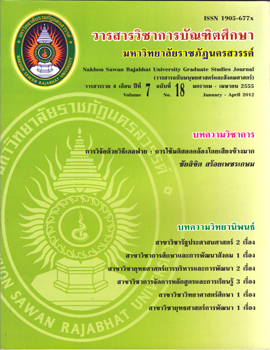กลยุทธ์การพัฒนาระบบการประกันคุณภาพภายในของมหาวิทยาลัยราชภัฏ กลุ่มภาคเหนือตอนล่าง
Main Article Content
Abstract
บทคัดย่อ
การวิจัยนี้มีวัตถุประสงค์เพื่อ 1) ศึกษาสภาพปัญหาของระบบการประกันคุณภาพภายในและความต้องการเกี่ยวกับการพัฒนาระบบการประกันคุณภาพภายใน 2) พัฒนากลยุทธ์การพัฒนาระบบการประกันคุณภาพภายใน และ 3) ประเมินกลยุทธ์การพัฒนาระบบการประกันคุณภาพภายในของมหาวิทยาลัยราชภัฏกลุ่มภาคเหนือตอนล่าง ดำเนินการวิจัยตามขั้นตอนการวิจัยและพัฒนา 3 ขั้นตอน ได้แก่ 1) ศึกษาสภาพและปัญหาของระบบการประกันคุณภาพภายในและความต้องการเกี่ยวกับการพัฒนาระบบการประกันคุณภาพภายใน เทคนิควิธีการวิจัยที่ใช้ได้แก่ การสัมภาษณ์เจาะลึก การวิเคราะห์เอกสาร การสำรวจความคิดเห็นด้วยแบบสอบถาม และการสัมภาษณ์บุคลากรที่เกี่ยวข้อง 2) การวิเคราะห์ปัจจัยสภาพแวดล้อมและการพัฒนากลยุทธ์ฯโดยการประชุมเชิงปฏิบัติการผู้เชี่ยวชาญ 10 คน และการสัมมนาอิงผู้เชี่ยวชาญวิพากษ์ร่างกลยุทธ์ฯ 9 คน 3) การประเมินกลยุทธ์ฯ ใน 4 ด้าน คือความสอดคล้อง ความเหมาะสม ความเป็นไปได้ และความเป็นประโยชน์โดยผู้เชี่ยวชาญ จำนวน 23 คน
ผลการศึกษาพบว่า
1. สภาพการปฏิบัติงานตามระบบการประกันคุณภาพการศึกษาของมหาวิทยาลัยราชภัฏกลุ่มภาคเหนือตอนล่างโดยรวมภายใต้องค์ประกอบของระบบมีการปฏิบัติในระดับดี จุดแข็ง คือ มีระบบและกลไกการประกันคุณภาพที่ชัดเจนเป็นระบบและมีผู้รับผิดชอบองค์ประกอบที่ชัดเจน แต่จุดอ่อนที่เป็นปัญหาสำคัญ คือ ระบบสารสนเทศเพื่อการประกันคุณภาพ และกระบวนการติดตามตรวจสอบคุณภาพ และการพัฒนาคุณภาพ ผลประเมินองค์ประกอบที่ 9 ระบบและกลไกการประกันคุณภาพการศึกษาในปีการศึกษา 2551-2553 มหาวิทยาลัยในกลุ่ม 3 แห่ง มีผลประเมินลดลง และเมื่อวิเคราะห์ปัจจัยสภาพแวดล้อมจากศึกษาสภาพและปัญหากับความต้องการเกี่ยวกับการพัฒนาระบบการประกันคุณภาพภายในของมหาวิทยาลัยกลุ่มภาคเหนือตอนล่างมีจุดแข็ง 13 ข้อ จุดอ่อน 16 ข้อ โอกาส 11 ข้อ และอุปสรรค 8 ข้อ
2. การพัฒนากลยุทธ์การพัฒนาระบบการประกันคุณภาพภายในภายใต้วิสัยทัศน์ มหาวิทยาลัยราชภัฏกลุ่มภาคเหนือตอนล่างนำระบบการประกันคุณภาพการศึกษาเป็นวัฒนธรรมองค์กรที่พัฒนาศักยภาพสู่สากลซึ่งประกอบด้วย การกำหนด 3 พันธกิจ 3 เป้าประสงค์ 3 ประเด็นกลยุทธ์และจัดทำ 9 กลยุทธ์ 33 มาตรการ 90 ตัวชี้วัด
3. ผลการประเมินกลยุทธ์ฯ ในด้านความสอดคล้อง ความเหมาะสม ความเป็นไปได้ และความเป็นประโยชน์อยู่ในระดับมาก
Abstract
This research has the aims as 1) study the conditions and problems of the quality assurance system and the needs of quality assurance system development, 2) develop the strategy of quality assurance system and 3) evaluate the strategy of quality assurance system development for Rajabhat universities of the lower region in the north of Thailand. This research is R&D and had 3 processes as 1) study the conditions and problems of the quality assurance system and the needs of quality assurance system development. There were 4 tools using as on in-depth interview, document analysis, a questionnaire which surveyed the opinions of 3 groups as 56 administrators, 190 all levels of quality assurance committees and 285 university’s staffs, and an interview of 10 related officers. 2) Analyze the environment factors and develop the strategy by 10 expertise’s workshop and 9 expertise’s connoisseurship. 3) Evaluate the strategies in 4 issues as the consistency, propriety, feasibility and utility by using 23 expertise’s evaluation forms.
The research results found that
1. The whole image of the conditions and problems of the quality assurance system was at the good level. The strengths were the quality assurance system clearance and specific responsible people in each content. The weaknesses were the decrease of the IT for the quality assurance and the evaluation processes of the 9th content in 2008-2011 of 3 universities had decreased. The environment analysis of the conditions and problems of the quality assurance system and the needs of quality assurance system development had 13 strengths, 16 weaknesses, 11 opportunities and 8 threats.
2. This research had created 3 missions, 3 goals 3 strategic issues and 9 strategies, under the vision of Rajabhat universities of the lower region in the lower north of Thailand leading the quality assurance system to be the organization culture which will develop the potential to the universal level.
3. The strategies were found to be highly consistent. appropriate, feasible and useful.


